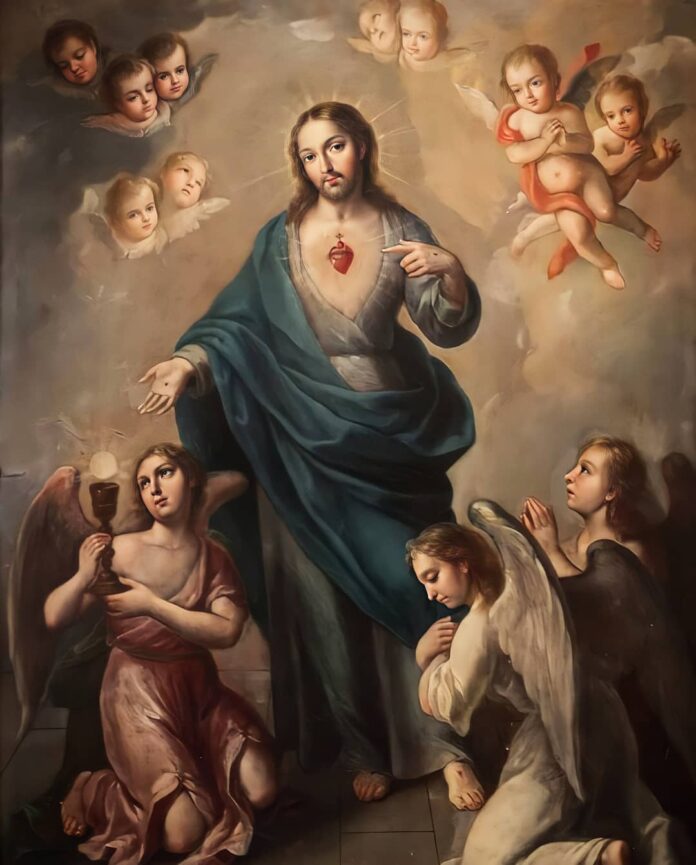Binding and loosing are two diametrically opposite actions. Yet, it is natural that the one who has the right to bind should have the right to let loose also. In the Bible we see our Lord granting this great power to bind and loose to the Church, his mystical body. It was but an extension of the ministry of Jesus Christ as he was the one who declared, ‘All power in heaven and on earth has been given to me’ (Mt. 28:18). He is the one about whom it is written;
‘He shall open, and no one shall shut; he shall shut, and no one shall open’ (Isaiah 22:22).
Jesus Christ is the same yesterday, today and forever. That is why John saw him exactly as Isaiah prophesied; ‘These are the words of the holy one, the true one, who has the key of David, who opens and no one will shut, who shuts and no one opens’ (Rev. 3:7). We read that Jesus bestowed the power to bind and to loose upon Peter whom he chose as the rock on which to build his Church. Peter was given the keys of the kingdom of heaven as well so that he may use this power judiciously as the Vicar of Christ on earth.
Today we are discussing about ‘Indulgence’ which flows from the ‘power of the keys’ granted to Peter. It has been a contentious issue through centuries. It was the reason for one of the major splits in the universal Church. For many, the term ‘Indulgence’ provokes the memories of an Augustinian monk who pasted ninety-five theses on the wall of Wittenberg Castle Church. His immediate provocation was the abuse of the theory and practice of indulgences. Admittedly, there were certain grey areas in the administration of indulgences in those days, which the Catholic Church rectified later. In course of time, the norms regarding the grant of indulgences were codified in the ‘Raccolta’. In 1967 under the papacy of Paul VI it went for another round of modifications and as of now the teachings of the Church vis-a-vis the subject of Indulgences is available in the apostolic constitution ‘Indulgentiarum Doctrina’ published the same year.
To have a meaningful discourse about such a contentious issue we need to start from the basics, lest we may be prompted to jump into conclusions heavily biased towards either direction. With a prayer to the Holy Ghost to illuminate our hearts to understand the subject in its true perspective, let us proceed.
What is an Indulgence?
—————————-
“An indulgence is a remission before God of the temporal punishment due to sins whose guilt has already been forgiven, which the faithful Christian who is duly disposed gains under certain prescribed conditions through the action of the Church which, as the minister of redemption, dispenses and applies with authority the treasury of the satisfactions of Christ and the saints.” ( CCC 1471)
So, indulgence is the remission of the temporal punishment due to sins. Doubts might start coming up right away. What is this temporal punishment? We know that there is a punishment for sin unless it is forgiven. The normal route for forgiveness is through the sacrament of Confession. We are taught that every person who approaches the confessional with a truly contrite heart and confesses his sins, obtains absolution from all the liability of guilt and he becomes entitled to eternal life. Where in the picture, then, does this temporal punishment come? Apart from eternal punishment, is there another punishment awaiting a sinner?
Let us address the issues one by one. The primary consequence of any sin is separation from God. Church teaches us that any person dying in a state of mortal sin cannot enter eternal life. But there are those souls who have no unrepented and unforgiven mortal sins outstanding against them at the time of death. Yet, there could still be some venial sins committed by them that are not confessed. Even in the case of a person who has confessed all his sins and obtained absolution, the negative effects of his actions (sins) need to be corrected in some way. For example, a person stealing something from his neighbor can get forgiveness of the sin at a later time provided he repents sincerely and receives the sacrament of confession with a contrite heart. But it doesn’t absolve him from the liability to give back what was stolen. Unless and until this is done, we cannot say that we have done perfect justice. God being perfect, we cannot be united with God if we are not perfect. To make the soul perfect, a process of purification is required. This purification can be either here before death or in purgatory after death. This element of suffering which we are bound to accept is called the temporal punishment of sin. The theology and logic behind the concept of temporal punishment is that every person is responsible for the consequences of his or her actions, even though God in his abundant mercy has absolved them from eternal punishment which is undoubtedly the gravest of consequences. An example will help us grasp this better.
David was a righteous man and the only blemish on this person was that ‘he struck down Uriah the Hittite with the sword, and took Uriah’s wife to be his wife and got the poor soldier killed with the sword of the Ammonites’. We are familiar with the rest of the story. Nathan comes to David and after explaining his guilt with the help of a parable, dramatically declares ; “You are the man”. Then follows the words of the Lord: “Now therefore the sword shall never depart from your house, for you have despised me, and have taken the wife of Uriah the Hittite to be your wife. Thus says the Lord: I will raise up trouble against you from within your own house; and I will take your wives before your eyes, and give them to your neighbor, and he shall lie with your wives in the light of this very sun. For you did it secretly; but I will do this thing before all Israel, and before the sun” (2 Sam. 12:10-12).
At the words of Nathan, David did repent from the depths of his heart saying; “I have sinned against the Lord”. The depth of his contrition can be read in Psalm 51. But he cannot undo what is already done. Before leaving the scene Nathan conveyed the final message from Lord the God; “Now the Lord has put away your sin; you shall not die. Nevertheless, because of this deed you have utterly scorned the Lord, the child that is born to you shall die” (2 Sam 12:13-14).
God will never forsake a person who repents about his sins. Nevertheless God’s justice demands that the sinner should suffer something, though not proportionate to the gravity of the sin committed, as expiation for his wrongs. As per law, the punishment for the sins committed by David – adultery and murder – is nothing less than death. But God’s forgiveness saved him from the capital punishment, but he was commanded to undergo a different kind of punishment.
Relating David’s experience to our subject, death means eternal punishment from which David was saved by the boundless mercy of God. But he had to go through those troubles prophesied against him in due course of time. It was the temporal punishment awarded to David. Confession takes away the sins and saves a person from hell. But he has to undergo its temporal punishment. We can say that by accepting the misfortunes sent on him, David paid off for his misdeeds. He had no other way but to suffer. But after the sacrifice of Jesus Christ on the cross, we are assured of forgiveness through his blood, and for remission of the temporal punishment, we have recourse to the Church, the mystical body of Christ. Indulgence is the surest way to get the liability of temporal punishment remitted.
Ideally, we are supposed to complete the purification of our souls during our lifetime itself. It can take various forms. Whenever restitution is possible, as in the case of theft, the wrong done should be rectified by restitution. But when restitution per se is not possible, our next course is doing penance and reparation in a suitable way. It is here that indulgences come into the picture. Catholic Church teaches: ‘The forgiveness of sin and restoration of communion with God entail the remission of the eternal punishment of sin, but temporal punishment of sin remains. While patiently bearing sufferings and trials of all kinds and, when the day comes, serenely facing death, the Christian must strive to accept this temporal punishment of sin as a grace. He should strive by works of mercy and charity, as well as by prayer and the various practices of penance, to put off completely the “old man” and to put on the “new man ( CCC 1473).
I hope the concept of indulgence is clear by now. Next and perhaps more important is how the Church can offer indulgence to a person. Many Christians, Catholics included, doubt about the authority of the Church to grant indulgences. The answer is simple. We have no doubt that the Church has the authority to grant forgiveness of sins as representative of Christ. Indulgence, being the remission of temporal punishment, is a natural corollary to redemption from eternal punishment. Isn’t it theologically and logically a sound argument that the Church bestowed with the power and authority of saving a person from eternal fire has the power and authority to exempt him from the immediate punishment also, which is not as grave as eternal punishment? If the Church has the power to save a person from the unending suffering of hell, why should we doubt about the Church’s power to absolve him from a lesser punishment? This is what we understand from the ‘the power of binding and loosing’ granted to the Church by Jesus Christ.“I will give you the keys of the kingdom of heaven, and whatever you bind on earth shall be bound in heaven, and whatever you loose on earth shall be loosed in heaven.” (Mt. 16:19)
While granting every indulgence the Church exercises this power to bind and loose granted to her by the Lord. Catechism explains it in these words; ‘An indulgence is obtained through the Church who, by virtue of the power of binding and loosing granted her by Christ Jesus, intervenes in favor of individual Christians and opens for them the treasury of the merits of Christ and the saints to obtain from the Father of mercies the remission of the temporal punishments due for their sins. Thus the Church does not simply want to come to the aid of these Christians, but also to spur them to works of devotion, penance, and charity ( CCC 1478).
Every currency note printed is supposed to be supported by some kind of monetary asset. Normally a central bank or national monetary agency cannot issue currency notes without supporting assets. The assets might be tangible or intangible. What asset does the Church have to draw from and disburse as indulgences? This is again a serious question. Fortunately, the Church has the largest treasury in this world. It is made up of Christ’s merits before God, prayers and good works of the Blessed Virgin Mary along with the prayers and good deeds of the saints throughout centuries. Church as the mystical body of Christ, has been entrusted with this priceless treasury of merits which she distributes by way of indulgences to those coming with a humble heart and supplicating hands. Some might doubt about the efficacy of the good deeds and prayers of saints and the Blessed Virgin in helping sinners to obtain remission of punishments. To get an answer, we need to recite the Apostles’ Creed once again. We profess that we believe in the ‘communion of saints’. Christ is one and his mystical body – Church – is also one and undivided. We, who are alive at present constitute only a part of the mystical body of Church. Those preceded us are now in heaven, and some others who couldn’t qualify for a direct entry into eternal bliss are still in purgatory with a solid hope that one day they will reach their heavenly home. Church is comprised of these three segments of believers. With this in mind, let us listen to what the Church teaches in this regard:
‘In the communion of saints, “a perennial link of charity exists between the faithful who have already reached their heavenly home, those who are expiating their sins in purgatory and those who are still pilgrims on earth. Between them there is, too, an abundant exchange of all good things.” In this wonderful exchange, the holiness of one profits others, well beyond the harm that the sin of one could cause others. Thus recourse to the communion of saints lets the contrite sinner be more promptly and efficaciously purified of the punishments for sin (CCC 1475).
We also call these spiritual goods of the communion of saints the ‘Church’s treasury’, which is not the sum total of the material goods which have accumulated during the course of the centuries. On the contrary the ‘treasury of the Church’ is the infinite value, which can never be exhausted, which Christ’s merits have before God. They were offered so that the whole of mankind could be set free from sin and attain communion with the Father. In Christ, the Redeemer himself, the satisfactions and merits of his Redemption exist and find their efficacy (CCC 1476).
This treasury includes as well the prayers and good works of the Blessed Virgin Mary. They are truly immense, unfathomable, and even pristine in their value before God. In the treasury, too, are the prayers and good works of all the saints, all those who have followed in the footsteps of Christ the Lord and by his grace have made their lives holy and carried out the mission the Father entrusted to them. In this way they attained their own salvation and at the same time cooperated in saving their brothers in the unity of the Mystical Body. (CCC 1477)
With this, I hope there should not remain any doubts about the theological foundation of the concept of indulgences. Believe that the Church has the power to grant indulgences. Believe that what is done here on earth by the Church is ratified there in heaven. Believe also that we as members of the mystical body of Christ, can approach Mother Church to draw from the inexhaustible treasury so as to get remission of our temporal punishments.
Now it is time to turn to the practical side of how to gain indulgences. Before proceeding further, please keep in mind that indulgence is not a substitute for sacramental confession. Rather it is something that should follow a true confession. Indulgence is not a permission to commit further wrongs nor can it be gained for future sins. Indulgence cannot be a substitute for restitution. The following conditions should be complied with by a faithful desiring to draw the gift of indulgence from the treasury of the Church. They are
-They should be completely and whole-heartedly detached from all sins of any kind, even venial sin.
-They should have done a valid sacramental confession
-They should have attended a full Mass and received the Holy Eucharist in a state of grace
-They should pray for the intentions of the Pope. Traditionally one Our Father, one Hail Mary and one Glory be is recited for this intention. Some people add the Apostles’ Creed also to it.
From the above we observe that faith in the Holy Eucharist and in the forgiveness of sins from Christ through the sacrament of confession are pre-conditions for seeking indulgence. Once the above-mentioned conditions are satisfied, the next step is to do the required ‘good work’ attached to indulgence. But before proceeding please remember that “An indulgence is partial or plenary according as it removes either a part, or all of the temporal punishment due to sin (CCC 1471). Accordingly the good works to be done for getting indulgence also differ considering the nature of indulgence sought. This can be reciting a prayer, visiting a particular church, reading the Scripture, visiting the Blessed Sacrament or praying a Rosary. The list of good works recommended by the Church is a lengthy one and need not be repeated here. However, some of the major devotions/good works that qualify for indulgence are given below:
1. Visiting the Blessed Sacrament for the purpose of adoration for at least half an hour.
2. Reading the sacred Scripture with the veneration due to God’s word and as a form of spiritual reading for half an hour
3. Praying the Rosary in a Church, prayer group, community or family. It should be with devout meditation on the mysteries and without interruption.
4. Spending at least three full days in a spiritual retreat.
5. Stations of the Cross – movement from one station to the other is mandatory.
6. Attending the Holy Mass celebrated by a priest on the 25th or 50th anniversary of his priestly ordination
7. Attending the first Holy Mass of the newly ordained priest
8. Attending the Holy Mass celebrated for First Communion
9. Apostolic blessing given by the priest at the time of Last Sacraments.
In all these cases, a plenary indulgence is granted to the faithful who are rightly disposed.
As far as partial indulgence is concerned making a sign of the Cross, reciting the Rosary alone, using devotional objects like crucifix, cross, scapular etc rightly blessed by a priest, reciting Psalm 51 in a spirit of penitence, reciting the Canticle of Mary (Magnificat), praying the litanies of the Blessed Virgin Mary, Saint Joseph, Precious Blood of Jesus, Sacred Heart of Jesus or Holy Name of Jesus, devoutly reciting Psalm 130, devoutly reciting the Apostles’ Creed, praying the Angelus or Regina Caeli and reciting the Act of Faith, Hope, Love and Contrition all entitles one to gain partial indulgence. Please bear in mind that both the lists are not exhaustive.
Having said this, we request the readers not to be swayed by the false teaching that it is easy to get away with the remission of temporal punishments through the short cut of indulgences. Every indulgence is a gift from God and made available to us through the perennial ministry of the Church. Mere recitation of a long litany of prayers will not make us entitled to it. Before submitting our supplications to God for indulgences, the first and foremost condition to be fulfilled is that we should be detached from all kinds of sins, including venial sins. Unless we approach the seat of mercy with a clean heart and clean hands we cannot expect anything from Him. Nowadays a tendency is growing in the Church to view Indulgences as something very simple. When a plenary indulgence is granted on special occasions like the year of mercy or the year dedicated to Saint Joseph, many Catholics run to their churches as if it is something freely distributed from there. No! We need to work for it. Simply going through the formalities will not absolve us from the liability of temporal punishment. Let us remember the words of Pope Paul VI that an indulgence cannot be gained without a sincere conversion of outlook and unity with God. If these conditions are satisfied, we can gain a plenary indulgence every day and we need not wait for special occasions. An Indulgence gained on a special occasion has no special value when compared to the Indulgences we gain every day.
Let us strive hard to gain as many indulgences as possible in the short time available to us. Indulgence is not for the living alone, it is equally available to the departed souls also. Catechism of the Catholic Church underlines this belief in gaining indulgences for the dead. ‘The faithful can gain indulgences for themselves or apply them to the dead’. (CCC 1471). To pray for the dead is a work of mercy which God values very much.
Needless to say, gaining indulgences for self and the departed dear ones should be given utmost priority. Make maximum use of the funds kept in the ‘treasury of the Church’ when the treasury is still open. Uncertain times are ahead and why should we leave this world with a heavy baggage of temporal punishments? May Jesus Christ who gave the power to the Church to bind and loose, shower his mercy on us through the instrument of Indulgence.




















